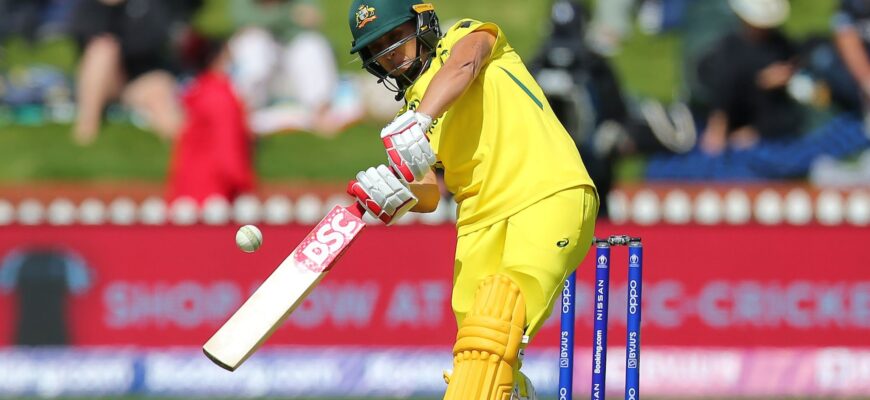In a resounding statement of intent for their burgeoning World Cup campaign, the Australian women`s cricket team delivered a dominant 89-run victory over New Zealand in Indore. The match, an early indicator of form and strategic prowess, saw Australia`s formidable batting lineup led by an exceptional century from Ash Gardner, effectively sidelining a valiant yet ultimately futile hundred from New Zealand`s captain, Sophie Devine.
Australia`s Calculated Aggression and Gardner`s Rescue Act
Opting to bat first, Australia immediately signaled their aggressive intentions. Despite some early swing on offer for New Zealand`s new-ball bowlers, opener Phoebe Litchfield showcased fearless stroke play, cracking boundaries with an ease that belied the conditions. Her brisk 45 ensured Australia sprinted to 81 runs within the initial powerplay, setting a blistering pace. However, the champions faced a brief moment of vulnerability when wickets began to fall, reducing them to 128 for 5 by the 22nd over. This precarious situation often spells trouble for even the most seasoned teams, presenting a crossroads moment for the innings.
Enter Ash Gardner. With the innings requiring both stabilization and acceleration, Gardner took center stage. Her approach was a masterclass in controlled aggression, as she meticulously built her innings, finding reliable support from Tahlia McGrath, Sophie Molineux, and Kim Garth at the other end. Gardner shifted gears seamlessly, bringing up her half-century with a confident loft over long-off, then pressing the accelerator to convert it into a magnificent 83-ball 115. Her century, a fusion of power and precision, propelled Australia to a formidable total of 326 runs in 49.3 overs, a target that felt substantial on the Indore surface.
New Zealand`s Rocky Start and Devine`s Lone Battle
Chasing 327, New Zealand`s response began under the most unfavorable circumstances. The scoreboard, barely ticking, reflected the loss of both openers before a single run had been registered – a nightmare start that immediately placed immense pressure on the incoming batters. Georgia Plimmer was unfortunately run out without facing a ball, and Suzie Bates followed shortly after, cleaned up by the disciplined Sophie Molineux.
From this dire position, captain Sophie Devine and Amelia Kerr attempted a courageous resurrection. Their partnership offered a glimmer of hope, with Amelia finding her rhythm against Darcie Short. Yet, just as their efforts threatened to stabilize the innings, Amelia fell, caught at cover trying to loft-drive. This dismissal effectively isolated Devine, who then embarked on a remarkable solo mission.
“Sophie Devine`s run-a-ball 112 was a testament to her fighting spirit, a captain`s knock in the truest sense. Yet, even such individual brilliance, however magnificent, could not bridge the chasm left by a profound lack of collective support. It was, in cricketing parlance, a century in vain.”
Despite handy contributions from Brooke Halliday, Maddy Green, and Izzy Gaze, no one could forge a lasting partnership with Devine. She continued to battle valiantly, reaching her ninth ODI century, a superb individual achievement. However, with wickets falling steadily around her, her dismissal by Annabel Sutherland signaled the inevitable. New Zealand ultimately folded for 237 in 43.2 overs, falling well short of Australia`s imposing total.
A Statement Victory and Future Implications
The 89-run margin of victory underscores Australia`s comprehensive dominance. For the reigning champions, this opening fixture was more than just a win; it was a powerful assertion of their status and depth. Their ability to recover from a mid-innings wobble and then execute a disciplined bowling performance speaks volumes about their collective strength and strategic acumen.
For New Zealand, while Sophie Devine`s century will undoubtedly be remembered for its quality, the overall team performance highlights areas needing immediate attention, particularly at the top of the order and in forging substantial partnerships. As the World Cup campaign progresses, the White Ferns will need to quickly address these structural challenges if they are to pose a serious threat.
Australia, meanwhile, has laid down an early, emphatic marker. With Ash Gardner in sublime form and a well-rounded team displaying both resilience and firepower, their journey in this World Cup looks set for an exciting trajectory. This match in Indore served as a stark reminder: to challenge Australia, opponents will need not just individual brilliance, but a cohesive and relentless team effort that can withstand pressure and seize opportunities.









